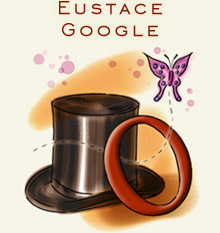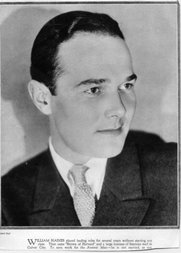Emdashes—Modern Times Between the Lines
The Basics:
About Emdashes | Email us
Ask the Librarians
Best of Emdashes: Hit Parade
A Web Comic: The Wavy Rule
Features & Columns:
Headline Shooter
On the Spot
Looked Into
Sempé Fi: Cover Art
Original "Brokeback Mountain" Online
Filed under: Eustace Google Tagged: Annie Proulx, books, Brokeback Mountain, fiction, movies

Recently posted to the magazine's website: Annie Proulx's October 13, 1997, short story, which inspired the film. (Update: The magazine's taken down the link. Copyright conflicts? Profits to be generated from sales of the story-to-screenplay mini-book? But a commenter saved the day—the link above is now to Outspoken Clothing, which is bravely hosting the story itself. Thanks, commenter and host!) Proulx talks about writing it in the L.A. Times:
Proulx, 70, in town recently for the premiere of Ang Lee's film adaptation of "Brokeback Mountain," says that while she was "blown away" by the movie, she doesn't welcome the return of Ennis and Jack to the forefront of her consciousness.
"Put yourself in my place," the author says. "An elderly, white, straight female, trying to write about two 19-year-old gay kids in 1963. What kind of imaginative leap do you think was necessary? Profound, extreme, large. To get into those guys' heads and actions took a lot of 16-hour days, and never thinking about anything else and living a zombie life. That's what I had to do. I really needed an exorcist to get rid of those characters. And they roared back when I saw the film."
The story bubbled forth from "years and years of observation and subliminal taking in of rural homophobia," says Proulx, whose Pulitzer Prize-winning novel, "The Shipping News," was also adapted for the screen. She remembers the moment when those years of observed hatred began taking form. It was 1995 and Proulx, who lives in Wyoming, visited a crowded bar near the Montana border. The place was rowdy and packed with attractive women, everyone was drinking, and the energy was high.
"There was the smell of sex in the air," Proulx remembers. "But here was this old shabby-looking guy.... watching the guys playing pool. He had a raw hunger in his eyes that made me wonder if he were country gay. I wondered, 'What would've he been like when he was younger?' Then he disappeared, and in his place appeared Ennis. And then Jack. You can't have Ennis without Jack."
Proulx didn't think her story would ever be published. The material felt too risky; Ennis and Jack express their love with as much physical gusto as any heterosexual couple, and it happens in full view of the reader, without any nervous obfuscation. The backdrop is that wide expansive West that bore forth John Wayne and the Marlboro Man -- but here the edges of the mythos fray, and the world becomes chilly and oppressive.
The story was published in the New Yorker magazine in 1997, and screenwriter Diana Ossana read it one night when she couldn't sleep."It just floored me," Ossana says, speaking after a screening of "Brokeback Mountain." She ran downstairs to show it to her writing partner, who happens to be Larry McMurtry ("The Last Picture Show," "Lonesome Dove") and suggested they turn it into a screenplay.
...
The movie, like the story, does not pull any punches. The sex is just as graphic, the critique of rural homophobia just as angst-ridden and raw. Proulx doesn't pretend to know how the movie will play with audiences, but she likes that her message will be broadcast through such a popular medium.
"There are a lot of people who see movies who do not read," Proulx says. "It used to be that writing and architecture were the main carriers, permanent carriers, of culture and civilization. Now you have to add film to that list, because film is the vehicle of cultural transmission of our time. It would be insane to say otherwise, to say that the book is still the thing. It isn't."
In the Southern Voice, more about the hard ride between story and screenplay:
"I recognized immediately that this was a story that was a work of genius," says McMurtry..."And I wondered, why didn't I write it? I've been there in the West my whole life."
Before the end of the year, the two had optioned Proulx's short story with their own money, but waited in vain as directors and stars came and went on the project. Gay filmmaker Gus Van Sant was attached for a while, as was fellow gay auteur Joel Schumacher.
Actors who saw the screenplay would tell Ossana it was the most beautiful script that they'd ever read but then, a few months later, would strangely distance themselves from the project.... Continued.
Update: There's a good, concise history of gay material in movies in the SF Chronicle. If you still haven't seen The Celluloid Closet, rent it--it's so entertaining as well as true, right, informative, etc. One of the best bits is when Tom Hanks says something like, "I don't exactly walk into a room and intimidate people. So when I'm cast as a gay man with AIDS, people are like, 'Aw, look, it's little Tommy Hanks! That's not scary.' " It made me sorta like him again. Susan Sarandon is also, of course, great: "You wouldn't have to get drunk to bed Catherine Deneuve, I don't care what your sexual history to that point had been."

And I really hope someone's working on a screenplay from William Mann's riveting and galling Wisecracker: The Life and Times of William Haines, Hollywood's First Openly Gay Star, a biography of the forgotten early-film headliner (pictured above). When the book was published, Film Forum showed a week's worth of Haines' movies (silent and talkies--he made the transition with panache), and I'm telling you, they were great. He used to get top billing over Joan Crawford! Maybe now's the time to do this stylish, audacious, history-correcting story, especially with Tab Hunter coming out and all. ( I met a savvy, award-winning screenwriter named J. T. O'Neal at the movies recently; I bet he could do it.) Think of the hot actors who'll run for the part, now that they see how it's done.
Update update: Isn't the wording interesting throughout this Catholic News Service review of Brokeback Mountain?
As the Catholic Church makes a distinction between homosexual orientation and activity, Ennis and Jack's continuing physical relationship is morally problematic.
The adulterous nature of their affair is another hot-button issue. But the pain Jack and Ennis cause their families is not whitewashed. (The women are played with tremendous sympathy, not as shrill harridans.) It's the emotional honesty of the story overall, and the portrayal of an unresolved relationship -- which, by the way, ends in tragedy -- that seems paramount.
Director Ang Lee tells the story with a sure sense of time and place, and presents the narrative in a way that is more palatable than would have been thought possible.
...
Looked at from the point of view of the need for love which everyone feels but few people can articulate, the plight of these guys is easy to understand while their way of dealing with it is likely to surprise and shock an audience.
Except for the initial sex scene, and brief bedroom encounters between the men and their (bare breasted) wives, there's no sexually related nudity. Some outdoor shots of the men washing themselves and skinny-dipping are side-view, long-shot or out-of-focus images.
While the actions taken by Ennis and Jack cannot be endorsed, the universal themes of love and loss ring true.
Update update update: More on Proulx, Lee, Ossana, McMurtry, and the story's journey to the screen, in the Austin American-Statesman (originally in the Denver Post).
Update x 4 for you lovely googlers: Read the always brilliant James Wolcott on bloggers who protest too much and "the genteel homophobia hovering behind the he-man hand-fluttering about Brokeback Mountain's mainstream prospects."
And here's the Out review.
Categories: Movies, Fiction, Proulx, Lane




Comments
Lots of intriguing context for the film. I didn’t know I was interested, but now I am … And since when are we rivals? Just because two people are engaged in similar projects doesn’t make them rivals. In fact, under the right circumstances, just the opposite. Teammates, fellow travellers, co-conspirators, partners in crime, accomplices, helpmates, star-crossed lovers, tag-teams, identical cousins, sidekicks, co-editors, collectives, tennis partners, soul mates, odd couples … I could go on. But I do like the re-organization of the sidebar. Like content seems more clearly grouped with like. At least, it was difficult for me to sort out writers and artists before.
Not really rivals, friend! Though I always did need a little mild competition to goad me into excellence, or at the very least into showing up. And thanks on the new, cleaner (99 44/100%) sidebar. For those who’ve been rudely and temporarily dropped, I will be reintroducing the blogroll somewhere, rest assured.
Thanks for all the background for the movie. I’ve been reading whatever I can find, and I still hadn’t seen that first one about Annie Proulx dreading going back to the characters for the film. She’s a crochety type, in everything I read, but a brilliant writer.
You can still read the short story here: http://www.outspokenclothing.com/brokeback.html
Another tidbit: In 1998, The New Yorker released a spoken word version of the story thru Mercury Records read by Suzy Amis with a soundtrack by L7’s Donita Sparks, “a tour de force performance” Billboard said.